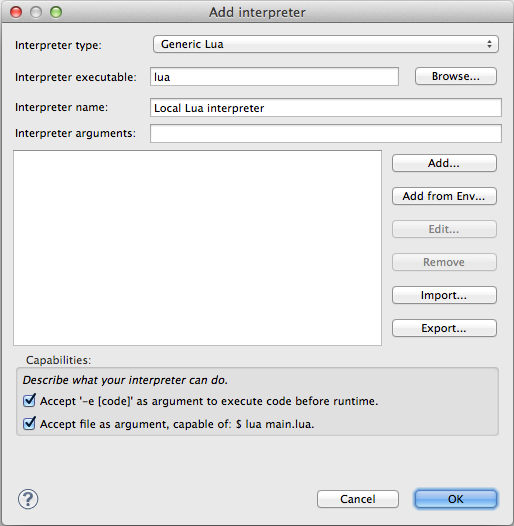Notice: this Wiki will be going read only early in 2024 and edits will no longer be possible. Please see: https://gitlab.eclipse.org/eclipsefdn/helpdesk/-/wikis/Wiki-shutdown-plan for the plan.
Koneki/LDT/User Area/New and Noteworthy/New and Noteworthy 1.0
Contents
New & Noteworthy 1.0
Here are the new features available in Lua Development Tools 1.0 M1, released on April 19th, 2013.
This version is available from the Koneki p2 repository at http://download.eclipse.org/koneki/releases/stables.
Support of Lua 5.2
LDT now provides a Lua 5.2 user experience directly shipped with the product. Which means LDT provide out of the box:
- Embedded Lua 5.2 Execution Environment which provide great user-assistance (content-assist, documentation,...)
- Built-in Lua 5.2 interpreter based on JNLua which enable running and debugging applications out of the box.
Support of LuaJIT debug
LDT debugger is now compatible LuaJIT 2.0.x interpreter. LuaJIT is a Just-In-Time Compiler (JIT) for the Lua programming language.
Enhanced support of non-standard interpreters
It's now possible to define an interpreter which doesn't handle the -e option, right from interpreter preferences page.
This option enables to execute a piece Lua before runtime. It was used by Koneki LDT to start all debugging sessions. Now it is possible to bootstrap a debug session without it, it makes Koneki LDT compatible with more kinds of interpreters, but be aware that in this case the user is responsible for launching the debugger by adding the following code as first statement of its application:
if os.getenv('DEBUG_MODE') then require "debugger"() endNote: The DEBUG_MODE environment variable is set only for debug, to avoid to start the debugger for a regular run.
Better user-assistance
It's now possible to type and set a description a local var or a global var by adding a comment before or after the declaration of the variable. A global variable declaration is when the global is affected for the first type. Typing a variable allow to have auto-completion on it and clarify your code.
If a function parameters is documented and associated with a type using the Lua Documentation Language, parameters in the code are also associated with the given type and that enable auto-completion on it.
If a @type or @module tag from the Lua Documentation Language is directly followed by a variable declaration, the declared type or module type is associated to the variable.
Enhanced outline
The outline now contains new stuff such as global variables and local and global functions. Also the type of outline elements is not displayed if any. It's also possible to type and attach a description to a local or global variables by adding a comment just before or after the variable as follow.
Integration of the last version of Metalua
Metalua is the key component that analyze the Lua code. LDT now use the last version of Metalua which the enhance syntax error handling and fix some clue bugs.

